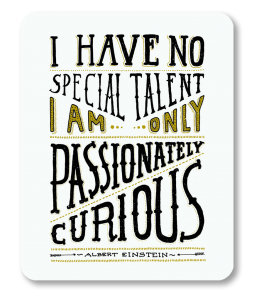
My Dad passed away a little over a year ago at the age of 85. All who knew him would say he was a “young acting” guy for at least 84 of those years – until his illness got the best of him. His youthfulness was expressed not in athleticism or a high energy personality. In fact, he would be best described as a slow-moving, soft-spoken type. Dad remained young in mind and spirit because he was a continual learner. Place him in an unfamiliar setting or introduce him to an unknown piece of technology or machinery, and you could watch his eyes surveying the situation with a great deal of interest, not only for how things work, but why they work and where they fit in. The focus was on the application of learning, not just knowledge acquisition.
Dad was educated only through high school, and no one would have accused him of being a stellar student. However, Dad was a continual, reliable source of know-how and wisdom for this MBA-educated son. My brothers and I often poked fun at Dad for his resistance to assembly instructions and user guides. Only at a point of desperation would Dad read the dreaded manual. He relied on common sense and confidence in his own ability to master the technical aspects of most any gadget, project, or circumstance to which he was introduced.
 Today, Keller Schroeder looks for this same common sense and confidence as we recruit for talented employee-owners who can learn and adapt to the fast-changing tools and techniques within the IT industry. We call it technical curiosity. Few organizations have time or budget to spoon-feed all the training necessary to stay up to speed on best practices and current technologies. Today’s IT professional must take the initiative to seek out advice and experience, conduct necessary research, and rely on common sense to figure out how things work and where to apply them to solve problems.
Today, Keller Schroeder looks for this same common sense and confidence as we recruit for talented employee-owners who can learn and adapt to the fast-changing tools and techniques within the IT industry. We call it technical curiosity. Few organizations have time or budget to spoon-feed all the training necessary to stay up to speed on best practices and current technologies. Today’s IT professional must take the initiative to seek out advice and experience, conduct necessary research, and rely on common sense to figure out how things work and where to apply them to solve problems.
When I joined the workforce as an applications programmer in 1982, my COBOL language and IMS database knowledge carried me through most of my technical years because the tools of the trade were evolving at a much slower pace than they are in 2015. But even in my non-technical role today, I must resort to thinking like a “rookie” in order to stay sharp and stay on the learning curve (consider reading Liz Wiseman’s Rookie Smarts for more on this topic).
Today, no one coming out of college pursuing virtually any technical vocation can assume their academic training will carry them very far. They must be technically curious. As I mentioned in my May newsletter article, IT professionals must care about learning more than knowing. Being the expert in your area of competence may be critical to the success of your organization today, but having the curiosity and initiative to continually learn without being spoon-fed by instructions or teachers is equally critical to your professional viability for the long-term.
Larry May
President




